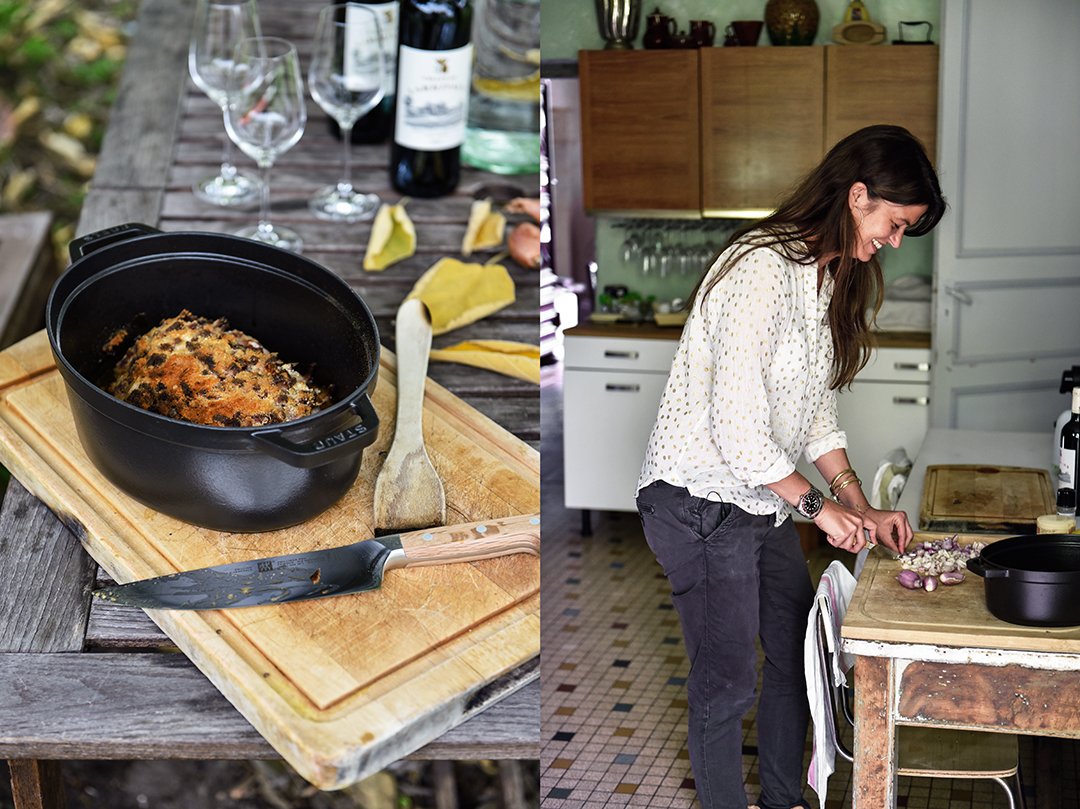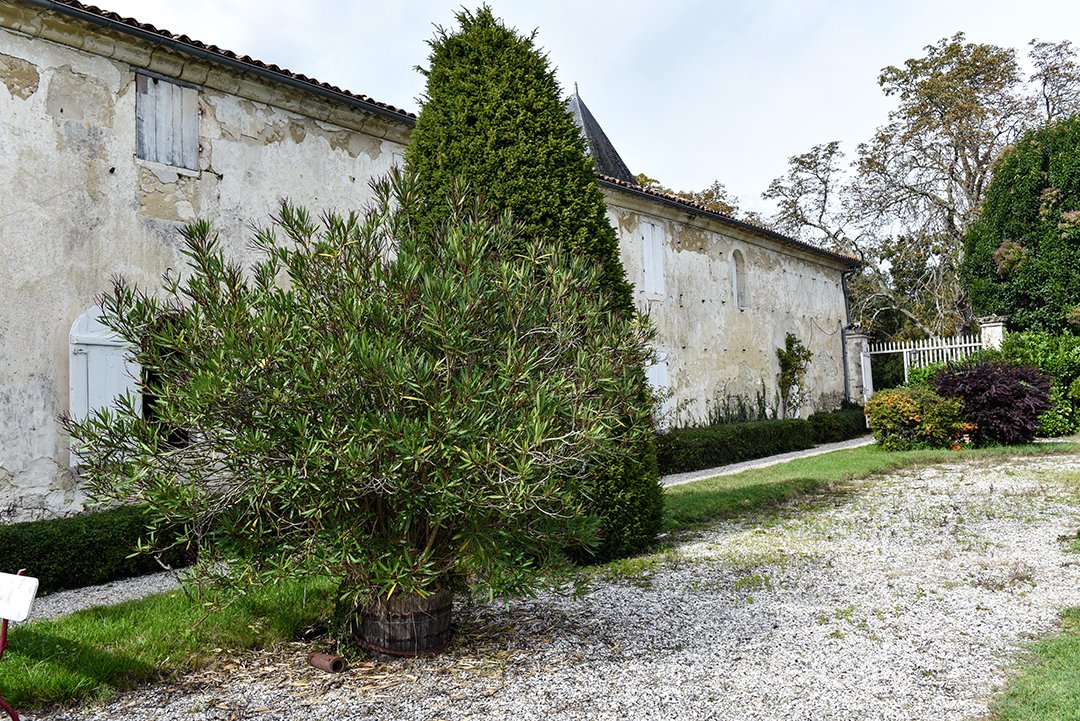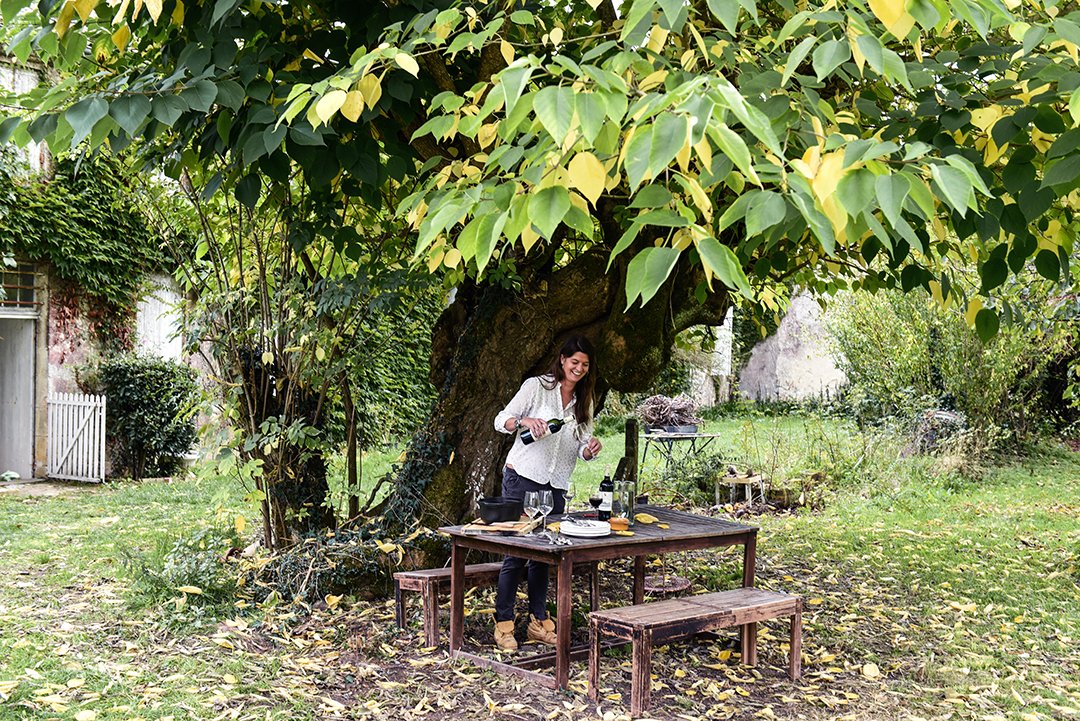Meet In Your Kitchen | Médoc's Wine and Food at Château Larrivaux
Fine gravel crackled and crunched under my feet, I felt a little dizzy, still overwhelmed by the beauty that I had just witnessed as I drove through the Médoc. If this region were a minimalist painting you'd see a block of green at the bottom and bright blue with white brush strokes at the top, divided by a gentle curve, the horizon. The vines grow in hard parallel lines, covering valleys and hills, and in between you see the most beautiful châteaux, majestic and elegant, the sturdy walls built of bright sandstone reflecting the sun. The grapes are plump, their juices seem ready to burst their skins at any moment, protected by large leaves hanging over the fruits like umbrellas. The region is praised for its food and wine, but its landscapes seduces your senses.
The gravel that I walked on was surrounded by oleander and boxwood shrubs, shaped like pregnant cones. It was a narrow path framing green lawns in geometric patterns, the garden of one of the dreamiest places I've seen in my life, the park of the mystic Château Larrivaux - home of the inspiring winemaker Bérangère Tesseron and her family. The estate is famous for its outstanding wines, thanks to the women who took care of the land since the château's cornerstone was laid on the grounds of Cissac-Médoc in 1580. Château Larrivaux was always in the hands of women, strong women, like Bérangère and the generations before her, her mother, aunts, and grandmother. They are passionate women, they love the family and traditions, and they taught Bérangère the sense of these values. They taught her to create something special at Larrivaux to pass it on to her own sons one day. "I'm just a little person, Larrivaux exists for five centuries, I'm here to take Larrivaux and give it to the next generation. You have to be passionate to work at the château, without passion you can't work here." There's just one problem, the winemaker has four sons. Her brother has a daughter, so the future will show if it will be female or male.
Bérangère's husband, Basile Tesseron, also comes from a wine dynasty, the equally famous Château Lafon-Rochet, just a couple miles further east. Both of them create the same product, the couple exchanges information about the weather, the harvest, but their businesses are separate. The two estates have different terroirs and approaches and therefore create different wines. "Making wine is all about feeling, intuition. I have more merlot, he has more cabernet, our wines are totally different." Château Larrivaux makes full-bodied wines, round, with a lot of fruit. "When I drink my wine, I want to eat something. It's a wine you want to share and finish the bottle."
Bérangère's life can easily seem perfect, like a picture book ideal, but it's tough, making wine is hard work. She learned to love the weather forecast, she has five apps on her phone. "We always think about wine, looking at the sky, thinking if it will affect the wine, that is stressful, but that's a part of the game." Due to the frost in April 2017, she only produced half the amount of bottles that usually fill the estate's wine cellar.
The family loves food and finds relaxation in their charming countryside kitchen inside the château's thick old walls. The worn kitchen table has been there since Bérangère laid her hands on it as a child. When she chops the vegetables from her garden, she has a beautiful view of the peaceful park. Everything in this room has a story to tell, every polished copper pot, every detail seems to have found its place through the twists and turns of life, not through a plan. The château is a labyrinth of long corridors with creaking floors and more rooms than one can count, full of antiques, velvet covered chairs, old paintings and drawings, wooden toys, and a deer head watching the scenes in the green painted living room for centuries. It's a fairy tale turned into a house.
The Tesserons love the French cuisine for celebrating the simple things, fresh fruits and vegetables, good meat and seafood. "When you have your plate in front of you, you know what you're going to taste, and when you have it in your mouth, you recognize all the different flavors." The kitchen plays an important role in their life, the kids who are 9, 7, 4, and 1 year old, love cooking with their maman, cleaning mushrooms or forming meatballs. They also bake chocolate cake on their own, "I never touch anything, but I watch them," says the trustful mother. And when she makes her famous Sunday classic, the family's recipe for Quasi de Veau de Larrivaux (tender veal roast with crunchy bacon topping), the family gathers happily under the ancient tree in the garden, enjoying food, wine, and life.
In the next months, I’ll share many Meet In Your Kitchen features with you that took me to California, Italy, France, and Japan. Thanks to Zwilling for sponsoring these features for our culinary trip around the world!
Quasi de Veau de Larrivaux
By Bérangère Tesseron – Château Larrivaux
Serves 4-5
1 boneless quasi de veau (veal rump roast), about 5cm / 2 inch-thick, 1kg / 2 ¼ pounds
6-8 shallots, thinly sliced
1 large lemon
Around 150g / 5 ounces bacon, cut into small cubes
A handful breadcrumbs
Ground black pepper
Fine sea salt
Preheat the oven to 180°C / 350°F.
Place the veal in a casserole or baking dish, just large enough to fit the meat. Spread the shallots on top of the meat and cover with the bacon. Squeeze the lemon juice over the meat, then sprinkle with the breadcrumbs. Season to taste with pepper and roast for 50 minutes. Add a splash of water and continue roasting for about 10 minutes or until the meat is tender. Let the meat sit, covered, for about 10 minutes before serving. Cut the meat into thick slices, depending on the bacon's saltiness season with a little salt, and enjoy with a glass of red wine.
Can you tell us a little more about the story behind Chateau Larrivaux?
We found out that we have produced wine since 1850, so it’s one of the oldest properties in the Médoc. And it is unusual that it is run only by women. And I have four boys!
So you have a problem!
I have a problem! But I have a brother who has a little girl, so maybe it will be the little girl.
Was there always active wine production here at the estate?
Yes, it never stopped but a long time ago there was not only wine. We had a lot of cows and it is a really big property, so we had different activities. But wine has been produced since the beginning. For us it is a family tradition. When I was young, on Sundays for lunch, we kids would have a brugnon (nectarine) – peaches with some wine and some sugar, and a little bit of water.
White wine?
Red wine!
To introduce the children to the tradition of wine drinking!
Yes, maybe!
Did you like it?
Yes! (Laughing)
Your husband also comes from a family that produces wine…
It’s totally separate. I have my property, he has his property. But it’s a family story. We work together because my husband and I, we have the same problems when we make wine, so we exchange a lot, but it’s totally separate.
Do you ever keep secrets, if you have a really, really good wine, do you keep it from him?
(Laughing) We don’t have the same terroir so we don’t have the same wine. Making wine is really a feeling, and we don’t have the same feeling. I have more Merlot at Larrivaux, and he has more Cabernet at Lafon Rochet. So the wine is totally different – you can’t do the same thing at Larrivaux and Lafon Rochet.
Do you see each other as competitors?
No, no, no.
Do you talk a lot about the weather, about the harvest?
Yes, every day. I love the weather forecast! It’s awful for me now because I have three or five apps on the iPhone for the weather forecast: “Oh my god, tomorrow it’s going to rain 2mm! Oh no, it’s going to rain 5mm!” We are always thinking about wine and everywhere we are, we are looking at the sky to see if maybe it will influence the vines.
Does it stress you?
Yes, but it’s normal when you work in agriculture. You’re always stressed by the weather. It’s a part of the game.
Have you ever considered producing organic wine?
For me, it’s really important to produce wine without or with little pesticides. Because I have four sons, and we live and spend a lot of time at Larrivaux I think it’s important for my kids to be able to come and run in the vineyard and not to be sick after. But for me, organic wine is not the real issue. It’s a step, it’s a good step but it’s not the final issue. The final issue is not to put any pesticides. When you make organic wine, you add cuivre (copper) or bouillie bordelaise (Bordeaux mixture) which is a product you can use in organic wine but it’s not good for the earth. So for me, producing organically is a good step but it’s not the final issue.
So it’s not important for you to get the certificate, the organic certificate, but you also use methods that are used in organic wine production.
Yes, at Larrivaux we prefer not to use a lot of added substances. Sometimes, if you have to use 1 liter of a certain product, we decide to only use half a liter. We accept that we’re going to have some disease in the vine but it’s not a problem. We’re not going to have lovely vines but it doesn’t matter. We want to make a good product but without a lot of bad substances to protect it.
How old were you when you knew you wanted to continue the tradition, when you also wanted to become a winemaker yourself?
When I was young I wanted to be a doctor. So not wine! I studied law at university for four years. In my fifth year, I decided to go into wine law. My aunt was working at Larrivaux but only on the weekends – it was not her principal job. Basile and I got married at Larrivaux in 2005. We went on honeymoon and when I came back, my aunt had a problem and she couldn’t work anymore. I said ok, I’m studying wine, and I want to work in the wine industry but maybe not at Larrivaux. But Larrivaux needed someone, so I decided to stay for a few months… and I never left!
You love it!
Yes. It’s really a passion. When you work on this kind of property, a small property and everything is old, you can’t sell your wine very expensively. It’s not an expensive wine, so it’s very difficult. So you have to be passionate!
How many bottles do you produce a year?
60,000. It depends on the year. This past harvest, we only produced half of what our production normally is because of the frost in April.
Where can people buy your wine? Do you sell it online on your website?
Not on our website, but I work together with some websites, so you can find it online without any problem.
Is there a certain characteristic of the women at Larrivaux? Is there something, when you look at the women before you – and you are a very strong woman – is there something characteristic where you can say, “That’s a Chateau Larrivaux woman?”
Passion! All of my aunts, my mother, my grandmother – the Chateau Larrivaux Woman is a strong woman. They are passionate, they love their family, they love tradition, and they really give me this sense, the family tradition. I really want to make something with Larrivaux to give it to my sons. I think it’s important. I’m a little person and Larrivaux has been here for 5 centuries. So I’m just here to take care of Larrivaux and to…
…give it to the next generation.
Yes!
And what if the next generation is a boy? Is that ok for you if there isn’t a girl?
I only want for my kids to be happy. If I only have one kid, or no kid who loves wine, it doesn’t matter. At Larrivaux, you have to be passionate to work at Larrivaux. If they are not passionate, they can’t work here. So, we’ll see!
What makes the Chateau Larrivaux wine special?
It’s a wine that’s full-bodied with a lot of fruit. Because we have a lot of Merlot, it’s a round and sweet wine. For me, when I drink wine from Larrivaux, I want to eat something. Which is perfect for me because I love to eat (laughing)! For me, it’s a wine you want to share and to finish the bottle.
What is the essence of French cuisine for you?
For me, it’s simple things: good vegetables, good fruits. You don’t have to add a lot of things. For me, French cuisine is when you have a plate in front of you and you know what you are going to taste. And when you have it in your mouth, you recognize the different tastes of the things you have on your plate.
Do you produce your own fruits and vegetables here at Chateau Larrivaux?
Not all of them, but I do have some vegetables, yes. And it’s not organic – I don’t put anything!
That’s organic!
No, it’s more than organic!
Did food always play an important role in your family? Wine was always there, but the food?
Yes.
Did you always cook with the family?
Yes, yes, yes. I always saw my grandmother cooking, my aunt and my mother too. I always saw people working in the kitchen.
What do you love about the Médoc?
The place itself because there are a lot of places in the Médoc. You have the vineyards, but you also have the seaside. You have the countryside, but it’s only one hour from Bordeaux. There are a lot of things to do in the Médoc, but it’s a secret spot for the moment. So it’s great. It’s good for us. You have a lot of things to do in the Médoc – there’s not only the wine.
If you could choose one person to cook a meal for you, who would this person be and what would this person cook for you?
I can only choose one person?
Ok, two! You can choose two.
Two? Ok. Alors… only two?
Ok three! Starter, main, and dessert!
Ok, my grandmother because she makes a huge sort of gougère – it’s a little choux with some cheese. And she makes a big gougère with béchamel and it was delicious! She’s the only person who made this like that. Then, I choose my husband, because for my birthday he sometimes makes paris-brest and I love the paris-brest! I think it’s difficult to have a good paris-brest. So every year I ask him to make one for me.
And one more person for the dessert?
Maybe my mother, to make some profiteroles – some choux with some vanilla cream inside and some caramel on the top. Like a pièce montée. Here at Larrivaux, not every Sunday, but often, we have some choux with caramel.
Do you prefer to cook on your own or with other people?
It depends on the recipe. For family recipes, I prefer to be with my family: my children, my husband, my mother. For recipes I find in a book, I think it’s really important to share them with someone. Everyone has their fashion, they own way of doing things – I think it’s important to learn and to share.
Do you prefer improvised meals or planned meals?
Improvised. I can’t make a recipe and read everything. I always put a little bit, a little more, a little less…
Did you ever cook a meal that was so disastrous that you said I’m never going to cook that again?
Macarons! I’ve never made good macarons! But I want to learn. There is a dessert in Bordeaux – a strawberry macaron – inside you have whipped cream with vanilla and fresh strawberries. It’s very good!
Thank you, Bérangère!


















